The E-Mountain Bike (eMTB) Buyer’s Guide
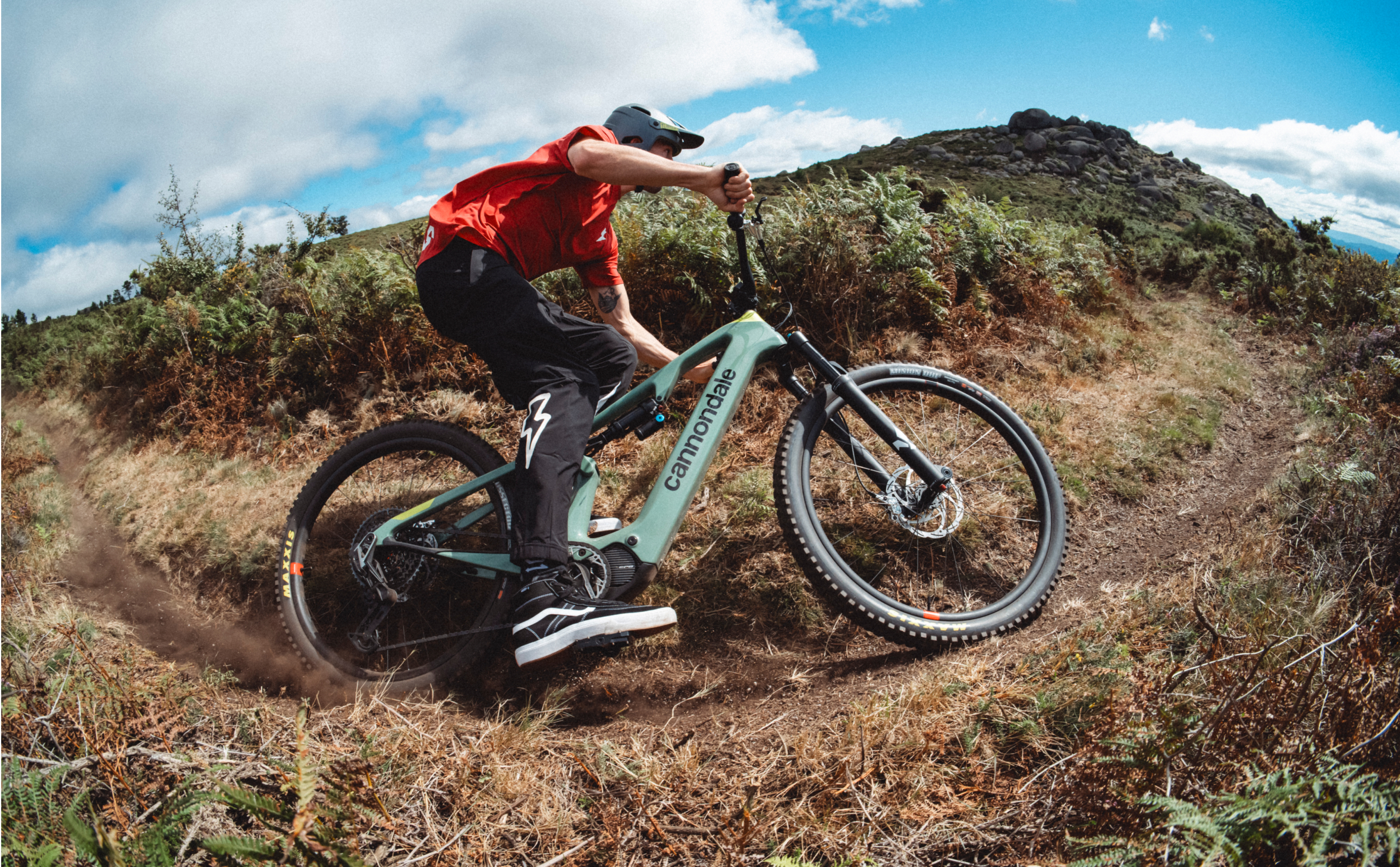
eMTB Buyer’s Guide | Everything You Need to Know About Electric Mountain Bikes
Get into the flow – uphill and downhill. Expand the range of your rides. Enjoy even more fun and opportunities to explore off-road.
Sound like fun? Then check out an electric mountain bike, or eMTB. After decades of some of the most advanced and innovative mountain bikes and mountain bike tech in the world, Cannondale then became one of the original eMTB pioneers. Today, our catalogue includes a wide range of eMTBs, with each designed for a different riding experience. Which one’s right for you? This Buyer’s Guide is our way to help you find out.
The Different Types of E-Mountain Bikes
How Do I Find the Right Frame Size for My E-Mountain Bike?
What Are E-Mountain Bikes?
Electric mountain bikes feature an integrated electric motor that supports your pedaling effort on the bike, giving you an extra boost whenever you need it. You can switch between various levels of assistance, but the motor only works when you are putting in effort yourself, so you can still get a decent workout.
A control unit on the handlebars allows you to choose how much, or how little, additional power the motor adds to your pedaling. With less effort required overall, this can increase your riding range. The better you manage the work the motor is doing, the longer the battery will last.
Just like all other e-bikes – sometimes known as pedelecs – eMTBs have a certain legal limit to the maximum assisted speed. In Europe, it's 25km/h, or 15.5mph, while in most of North America, this assist limit is 32km/h, or 20mph. If you want to gain speeds above the limit, you'll need help from either your legs or gravity.
The electric motor, battery, and reinforced frame make most eMTBs heavier than regular mountain bikes. They also can have different riding characteristics. However, thanks to the motor's assistance, plus the smart suspension and geometry engineered into our eMTBs, Cannondale electric mountain bikes offer a comfortable and familiar mountain biking feeling while allowing for an amazing new riding experience at the same time.
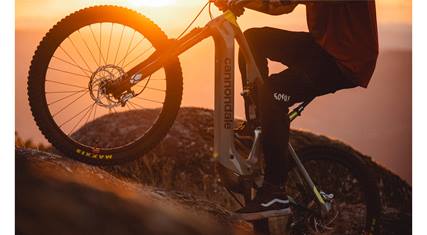

The Advantages of an eMTB
Before you buy an eMTB, you might ask yourself whether you need one at all. Of course, you can still have great fun on a modern mountain bike without a motor, but eMTBs come with some advantages over their “analog” counterparts.
Thanks to the pedaling assistance, your range increases significantly, regardless of your physical fitness level. You can ride longer and further, and reach places that you normally wouldn't, or you can simply spend more time on your favorite trails.
To get through physically demanding sections, an e-motor is ready. It supports you on every uphill if you want it to, whether short and steep or longer and more grueling ones. Even if you’re not pointed up a climb, the electric assistance can be useful, powering you through particularly chunky technical sections on which you may otherwise struggle to keep your momentum.
And riders of any skill level can benefit from the electric motor’s boost. It can help more fit or experienced riders reduce fatigue and push themselves farther, while beginners can benefit from some extra power when they’re otherwise trying to focus on balance and line choice. As a bonus, riders across different levels of fitness can have an easier and more fun time when riding as a group across the same trails.
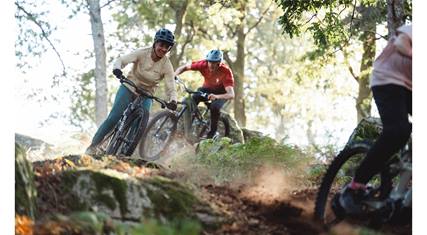

The Different Types of E-Mountain Bikes
Not all eMTBs are the same. At Cannondale, we have developed four different model platforms within the e-mountain bike category:
- Moterra- Moterra LT
- Moterra SL
- Trail Neo
The Moterra family name unites all full-suspension models. The Trail Neo, on the other hand, is our versatile electric hardtail.
Full Suspension vs. HardtailWhether your eMTB should have suspension front and rear, or only a suspension fork up front with a rigid rear end, depends on the type of terrain you want to ride and the experience you want to have. Suspension front and rear generally makes a bike more capable and comfortable on more technical terrain and at higher speeds. The typical tradeoff is only more weight, and for better or worse, a less direct feeling of the trail below.
In comparison, an electric hardtail like the Trail Neo is lighter and sometimes more nimble – with a simpler design that easier to maintain, too, thanks to fewer moving parts. Because there’s no suspension in the rear, you feel more of the trail below you, which can be an advantage or a disadvantage, depending on the trail and the skill of the rider. No matter a rider's level of experience, an electric hardtail can be perfect for your everyday adventures through moderate terrain like fire roads, forest trails, and easy singletrack.
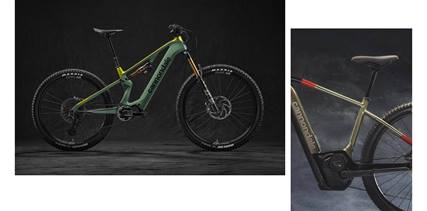

The Drive Systems
An eMTB's drive system consists of an electric motor, a rechargeable battery, and a control unit on the handlebars. In all our eMTBs, we only use mid-mounted motors, which means they’re integrated into the frame in the bottom bracket area (very near the pedals). This is more complicated than a hub-drive motor, which just sits in the rear wheel, but it offers a more balanced feel, with a low center of gravity, plus far greater power and range.
On a Cannondale eMTB, we rely on industry-leading drive systems from Bosch and Shimano. They differ in terms of power (specified in watts: W) and torque (specified in Newton meters: Nm). The current maximum torque in Cannondale's eMTB portfolio is 85Nm – a huge figure that boosts your output by up to 400%. Not everyone needs maximum torque, however. A lower torque output of just 60Nm is sufficient for most riding scenarios.
Some Bosch models are compatible with an optional 750Wh (watt-hour) supplemental battery pack that can easily be installed on your eMTB to provide an enormous extension of your range. With it, up to 175 additional kilometers (108 miles) are possible per ride, depending on a variables like terrain type, rider, gear weight, bike set-up, and other factors.
If a low overall weight of your eMTB is important to you, you can opt for lighter systems with a smaller battery and a lighter motor. This might be ideal if you don't cover long distances or just want to enhance your trail riding near home. Across all models, the Bosch and Shimano motors weigh between 2.7-2.9kg. (6.0-6.4lbs.), with similarly varying weights for the batteries and additional hardware.
For optimal handling and weight distribution, the batteries are integrated into the down tube of all Cannondale eMTBs. No matter which drive system your Cannondale eMTB comes with, they’ve all been engineered for excellent handling, stability, traction, and confidence over the trail.
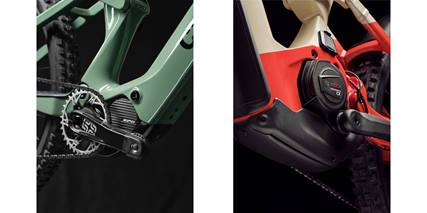

Frame Material and Suspension
Carbon or aluminum: it's your choice between these two materials for your new Cannondale eMTB. Which you choose may just come down to budget, but it’s not quite that simple.
Carbon fiber frames offer the best ratio of weight and stiffness. You want the bike to be “stiff” not in the sense that it is harsh to ride, but laterally stiff, so that the frame doesn’t flex and wobble too much, whether you’re pedaling hard or traversing tricky terrain. In addition to providing excellent stiffness, carbon is lighter than aluminum, making for easier maneuvering and acceleration. Carbon fiber also absorbs vibrations better than alloy, and this dampening can lead to a more calm and comfortable feeling over the trail.
The disadvantage? Carbon frames are far more costly to manufacture and thus more expensive. This means some kinds of repairs can be more expensive, as well.
For this reason, budget-conscious bike shoppers may want to consider aluminum frames, but at Cannondale, this is hardly a compromise. Decades ago, we introduced advanced aluminum production techniques that enabled us to build far higher-performing alloy bikes than anyone had ever thought possible. Our aluminum engineering is still at the forefront of the material’s use in cycling, so much so that our aluminum bikes sometimes are better than competitors’ carbon fiber bikes in overall performance.
Rear SuspensionWhen a mountain bike frame features a rear suspension system, its travel (the distance the wheel moves when impacted) and kinematics (the shape of the wheel’s movement as it travels) result in certain riding characteristics that can be finely tuned. Together, these suspension characteristics, along with the frame’s geometry, will enormously influence how your bike feels and performs.
While some bikes on the market use kinematics that are designed primarily to help aid downhill control, Cannondale’s approach is to use the dual suspension platform to help you all over the trail. Both front and rear wheels are engineered around kinematics that help not just with going downhill, but also uphill, by keeping the tire in contact with the trail at all times so you always have traction and control. You'll notice this advantage all over the trail, including climbs, descents, and when tackling more technical terrain.
Taking full suspension design a step further, we have developed the size-specific Proportional Response concept that we use in all models. It means that we adapt the geometry, suspension kinematics, and frame layout specially to each individual frame size. This unprecedented extra effort results in an individual riding experience that suits you perfectly.
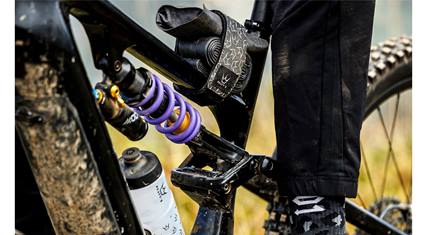

Suspension up front is provided by the suspension fork. Thanks to its spring and damping properties, it easily absorbs rocks, roots, and other edges in the terrain. This not only increases riding comfort, but helps you stay in control. The suspension’s feeling can be tuned in various ways, including specifically for your weight, with simple knobs and dials at the top and bottom of the fork.
Typically, the more travel the fork offers, the more plush it will feel. Hardtails usually have less travel in the front so that they are more balanced, since there’s no suspension in the rear. Conversely, this means that full-suspension mountain bikes generally have more suspension travel in front (and in back, of course) than hardtails. Cannondale's eMTBs feature forks from 100mm (about four inches) on the Trail Neo series, up to 170mm (about 6.7 inches) on the Moterra LT model range.
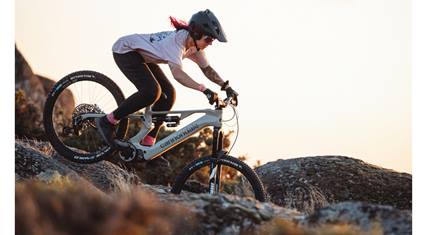

Which eMTB is Best For You?
To riders who want equal capability on both technical climbs and steep descents, we recommend models from the Moterra family. These are equipped with suspension travel of 150mm at the front and rear. The geometry is tuned to offer a perfect balance between stability, control, and fun.
The Moterra LT models offer more travel, with a suspension fork offering 170mm of travel along with 165mm of rear travel via a steel coil spring shock. This bike is for riders who prefer shredding downhill and riding big, technical lines, rather than tackling the steepest climbs.
The Moterra SL platform is the lightest of the three. This bike utilizes 160mm of travel in front and in back, allowing for excellent climbing and fast descending, but its design is focused on delivering sharp handling and playful agility, as well. Even with its low weight, the SL’s powerful motor and large battery still provide a true eMTB experience, with excellent power and range.
The Trail Neo delivers a hardtail experience that’s light, fast, and above all, lots of fun. Thanks to the bike’s powerful electric boost, robust aluminum frame, and stiff rear triangle, you can easily fly up the climbs yet stay in control on the way back down. Trail Neo’s suspension fork with 100mm of travel offers comfort and stability on moderate trails.
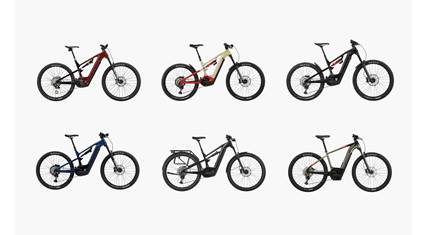

Right Components
The main components of an e-mountain bike are the shifting system, brake system, seat post, cockpit, and wheelset. The specifications of Cannondale's eMTBs are precisely tailored to the area of use for each model. For most technical singletrack riding, you'll want height-adjustable dropper seatposts, powerful four-piston disc brakes, and grippy, tubeless-ready tires. Our e-hardtails, on the other hand, save weight and complexity with components fitted for dependability, equally at home tackling some trails on the weekends and then commuting through town during the week.
Shifting Gears on Electric Mountain BikesWhen it comes to your eMTB’s gears, you have a choice between electronic and mechanical (cable-actuated) shifting systems. Electronic systems are the latest development here, being faster and more precise than the mechanical versions, with shifting action that feels more like pressing buttons than pushing levers. However, that advanced tech is more expensive, and relies on batteries that need to be charged regularly. With mechanical systems, there’s a bit more complexity in the setup, and they require a tiny bit more effort per shift, but they're tremendously reliable, never need charging, and are easier to repair in the middle of a ride, if necessary.
Wheel SizesMost high-end mountain bikes today come in two wheel sizes: 27.5 or 29 inches. In some cases, Cannondale also offers "mullet” versions – a mix of the larger diameter in the front and a smaller wheel in the back. Generally, wheel size has an influence on the riding characteristics of the bike, such as the roll-over characteristics or maneuverability. The 29-inch wheels roll over bumps and dips easier and offer more traction thanks to a longer contact patch on the trail, while the lighter 27.5-inch wheels offer more agility and faster acceleration.
The Cockpit of Your E-MTBThe stem and handlebars up front make up the cockpit. This is the control center of every eMTB. When set up properly for the rider, it ensures optimum control of the bike. The length of the stem and the width of the handlebars vary depending on the frame size. You can also change these parts after purchase. Check out our handlebars and stems if you want to improve the bike’s fit, lower its weight, or just feel better on the trail.
Practical Accessories for eMTBsIf you want to equip your bike for long rides, we recommend accessories such as upgraded grips, practical bags, or anatomically shaped saddles. Then, of course, there’s the Moterra EQ. It comes with fenders, a pannier rack, lights, and a kickstand. It’s perfect for commuting through town or having fun far away from it.
However, the most important accessory is a safe and comfortable helmet. Cannondale offers a variety of great ones, specifically designed for mountain biking, that you can see here.
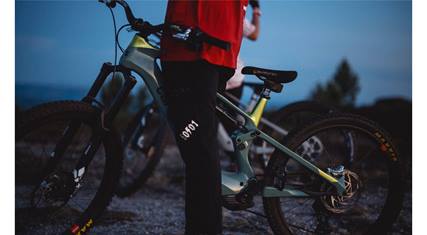

How Do I Find the Right Frame Size for My E-Mountain Bike?
Once you have decided on a preferred eMTB platform, you need to find the right frame size. Your height is the first consideration. If you enter this on the Cannondale website – by clicking on the “What’s my size?” button on each model’s page – you will receive an initial recommendation from us.
But sometimes, height is not the only factor. For example, if you have short legs and a long torso, or a short torso and long arms, or issues with flexibility, then your height is only part of the story. You may want to contact us for advice, or visit your local Cannondale dealer and ask some questions, and possibly even try the bike. In any case, you will receive professional support that helps you make the right choice.
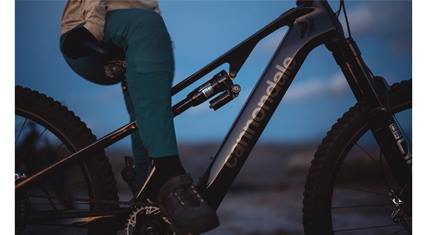

Service: How to Look After Your eMTB Properly
A new electric mountain bike from Cannondale is a combination of high-quality materials, complex parts, and advanced electronics. Proper upkeep of this remarkable machine will require the right care and maintenance. Remove dust, mud, and oil residue with bike-specific cleaning agents, and as soon as everything is clean and rinsed, you should dry your eMTB thoroughly. This can prevent parts from rusting or corroding, and electronics from being damaged.
There are right ways and wrong ways to clean a bike, however, even with the right materials. You can find various articles on the internet, and videos on services like YouTube, that can share details on what to do – and what not to do. Of course, ask your local Cannondale dealer for any advice on cleaning or professional cleaning services they may offer themselves.
And to help with all maintenance needs, try the Cannondale App. It offers automatic maintenance reminders, a nearby Cannondale dealer locator, video materials, and even a service history of your bike. You can also save details such as suspension settings, tire pressures, and whatever else. As a bonus when you register on the app, you are automatically registered for our warranty program as soon as you connect your Wheel Sensor to the app or scan the QR code. If you have any questions about the app, you can contact your Cannondale dealer at any time.
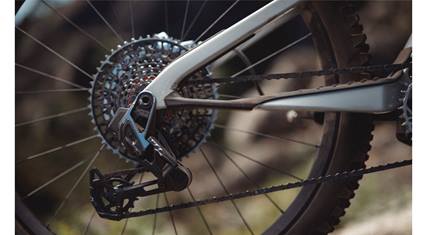

How Much Does a Good E-Mountain Bike Cost?
When it comes to determining the right amount of money to spend on an eMTB, there are many factors to consider. How big is your budget? What are you planning to do with your eMTB, as in, where do you want to ride it, and through what kind of terrain? How often will you ride? Do you plan on vacations where you’ll need to pack your bike for shipping or flying? Etc., etc...
These questions, and more, are part of figuring out what will be best for you. Hopefully our eMTB Buyer’s Guide has been helpful in laying a foundation of the basics. Contact us, or your local Cannondale retailer, to learn more – and hopefully, we’ll see you out there on the trails soon.
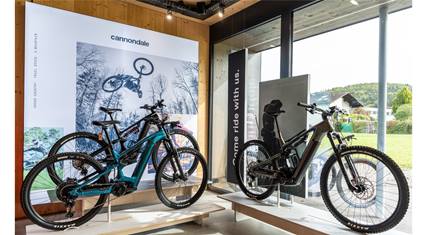
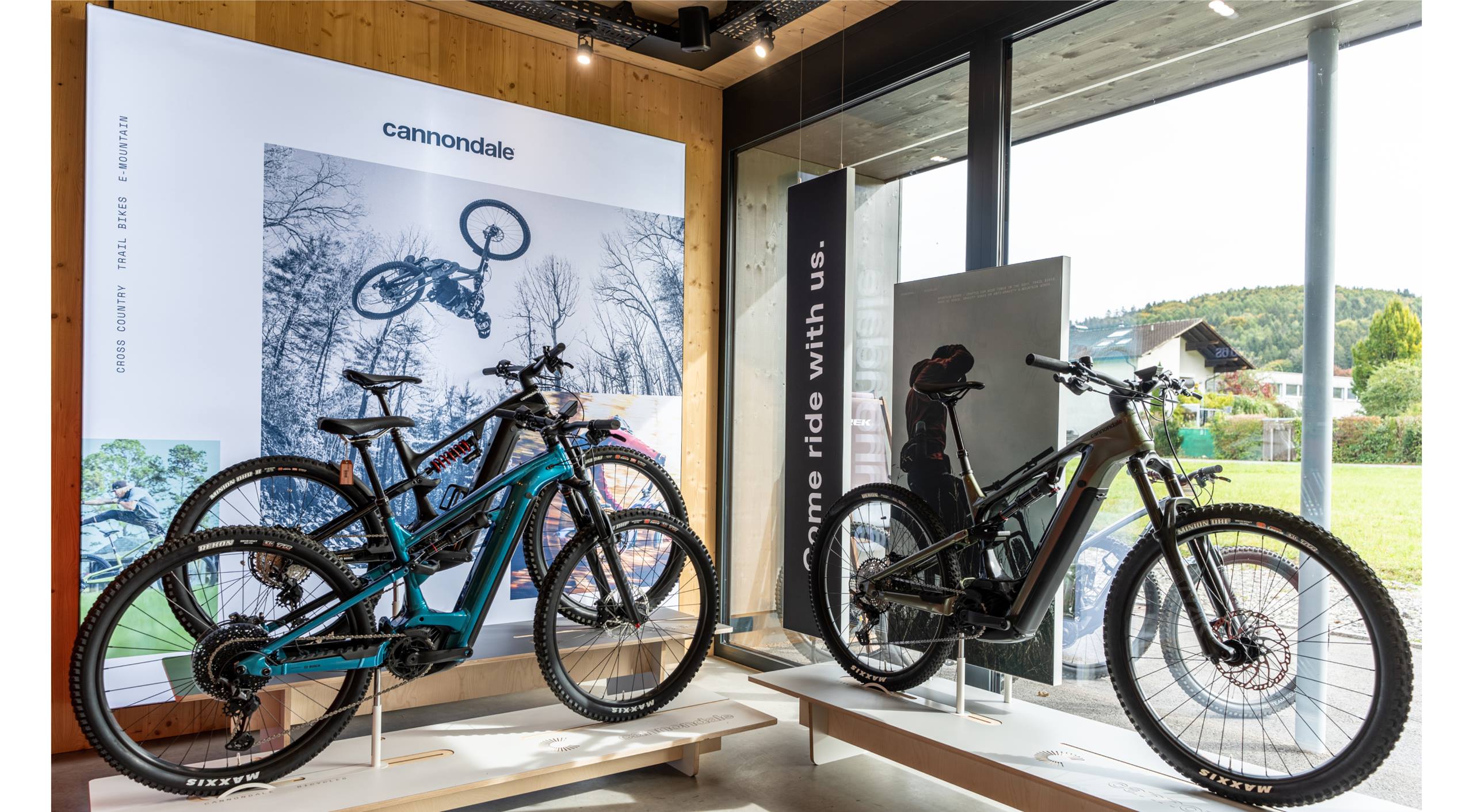
Need more gear before you are ready to roll?
See more parts and accessories here:
Shop Gear and Accessories

